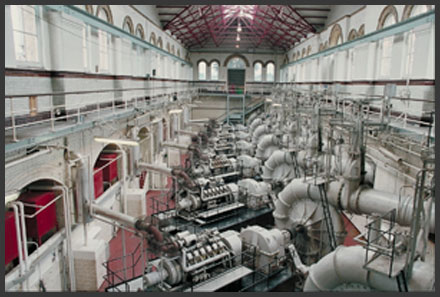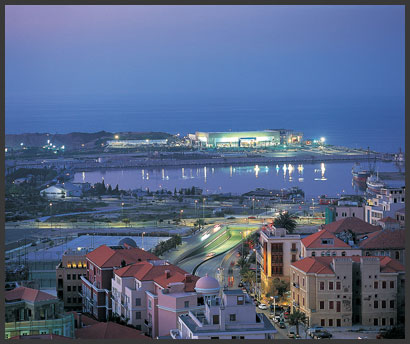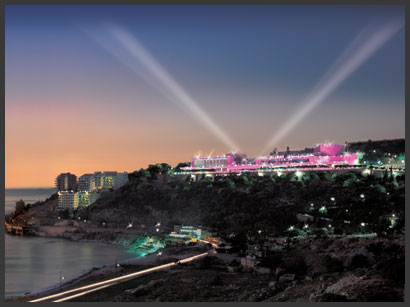Invest in Lebanon
The sectors that are covered are the productive sectors which led to sustainable job creation : industry, tourism , agriculture, agro industry, ICT as a whole, and media. In the first three months of 2010, 10 projects were submitted to The Investment Development Authority of Lebanon, which shows that there is a lot of interest to invest in Lebanon. The Investment Development Authority of Lebanon is ready to stand beside investors that would like to invest in Lebanon, and we have the ability to provide them with information about the economy, and whatever they want to do with their business.· They can visit our web site or contact as directly ; it is really an open policy for all investors willing to invest in Lebanon.
Interview with Nabil Itani, Chairman of Investment Development Authority Lebanon – IDAL
Under the guidance of the World Bank, the government of Lebanon has recently made noticeable efforts to reduce the amount of red tape in the public sector to streamline business processes and encourage foreign investment in the country.· What is your overall assessment of the economy ?
Lebanon depends on a free economy; a free economy led the country to play a very essential role in the region with a very high level of culture in the economy and the population. In 2001, the government had to encourage investment, and that’s why they enacted the investment law of Lebanon which gave investors lots of incentives and facilitation while cutting the red tape depending on certain target sectors. The sectors that are covered are the productive sectors which led to sustainable job creation : industry, tourism , agriculture, agro industry, ICT as a whole, and media .
Do you see a difference between the legislation itself and practice ?
All projects which match the criteria of Investment Development Authority Lebanon – IDAL have maximum facilitation.· We hope to facilitate for all people but for the time being we are doing our best to simplify their life in Lebanon while they establish their projects, and help them maintain after-care services.
Do you think that the government is doing enough towards investors ?
The Lebanese economy from the beginning is a free economy.· We have policies to open up the economy to all investors and we have no discrimination between local or foreign investors in the laws. In spite of all the conflicts in Lebanon after the assassination of ex-prime minister Al Hariri in 2005, we have maintained increasing growth of the FDI.
“You know that Lebanon is a small country and you cannot compare the size of investment with other countries size-wise ; you can compare by percentage of foreign direct investment to the GDP. The percentage between FDI and the GDP of Lebanon is· around 12%.”
What strategies does the government have for increasing investments ?
There are three main axes. One is to a erase the impact perception that was gained by investors due to the conflicts that occurred between 2005 and 2008. This erasing is achieved by branding Lebanon or re-branding Lebanon through the international community. Second is to create real investment opportunities, like creating some special economic zone dedicated to certain growing sectors. For example, the first one we are doing now is in Tripoli, and we are providing plans dedicated to some promising sectors such as a media city. This is part of establishing a stable and solid investment opportunity here.Third is to facilitate or remove some obstacles facing the whole investment climate.
How exactly are you changing the perception of Lebanon abroad ?
First you have to determine what the targets are. We have three main categories : the first one is the Lebanese ; locals and the ones in the diaspora. We have a huge diaspora, around 15 million people, which is around four times the population inside of Lebanon. Second are the Arab countries, especially the Gulf countries which are still the main foreign investors in Lebanon. Third is the international community; companies which can depend on Lebanon as a hub in the Middle East to serve the whole area depending on the skilled human resources that Lebanon has as well as its open policies. These are the main targets we are focusing on. The strategy is to communicate with these three categories and to show them what the possibilities of cooperation are. We have to show them what they can benefit from Lebanon.
Can you mention a particular success story that might represent what you’re doing in Lebanon ?
Since 2003, we have had 36 projects that have benefited from the services of IDAL. In the first three months of 2010, 10 projects applied for IDAL. In fact, we are encouraging a good number of projects in several sectors (mentioned above). Ericsson is one of these projects after establishing its centers in Lebanon to serve the area. There are also multiple hotels belonging to the international chains, in addition to pharmaceutical and industrial big projects. Agrofood industries are also among the promising investment opportunities. 
What is your final message to our international audience about Lebanon and about IDAL ?
IDAL is ready to stand beside investors, and we have the ability to provide them with information about the economy, and whatever they want to establish their business. They can visit our website on www.idal.com.lb or contact us directly because Lebanon is really the ultimate destination to invest in the region.